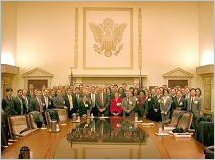Program Details & Objectives
 The Washington Campus MBA residencies are designed to equip students with the understanding necessary to anticipate, influence, and respond intelligently to government initiatives.
The Washington Campus MBA residencies are designed to equip students with the understanding necessary to anticipate, influence, and respond intelligently to government initiatives.
Included in each course are:
- Core sessions that examine the legislative, regulatory, and executive functions of government;
- Topical sessions on issues relevant to the business-government interface such as economic policy, monetary policy, business-government ethics, trade policy;
- Interactive sessions, including a computer simulation and a final session that explores how management can incorporate the public policy dimension into its decision-making and strategic-planning process.
An essential element of corporate competitiveness is a hands-on understanding of how federal policy is developed and the many factors and constraints that influence public policy decisions. Understanding Washington provides students with an inside view of Washington as a political marketplace and the effects of government upon corporate strategic planning.
Taken as a whole, the experience equips executives to contribute to the public policy process as:
- Users of corporate public affairs resources, including Washington, D.C. offices, issue analysts, lobbyists, lawyers, compliance officers, and accountants;
- Participants in corporate grassroots programs or political action committees;
- Direct representatives of their companies to Washington, D.C.
Sample Sessions
Decision Making in Washington, Congressional Committees, the Role of Lobbyists and Interest Groups, the Business/Government Interface, the Political Landscape, Congress: A Representative’s Perspective, the Future of the US Economy, US Foreign Policy
Sample Speakers
Presidential Candidate John Kerry, Vice President Dick Cheney, Representative Bill Archer (TX), Senator John Breaux (LA), Representative Charles W. Stenholm (TX), Jack Howard
Participant Profiles
Typical participants include MBA and other advanced degree-seeking students from The Washington Campus consortium of business schools, as well as students from other departments such as public policy and law.
Program Location
The program is presented in Washington, DC, and sessions are held in local conference facilities, as well as locations on Capitol Hill, in executive branch agencies, and other sites in Washington where policy decisions are made.
Course Schedule
Strategic Leadership is a week-long program, beginning on Monday at 8:00 a.m. and ending the following Friday at approximately 6:30 pm.
Students wishing additional time to explore the Washington, D.C. area should extend their trip accordingly.
In order to meet the minimum contact hour requirements of your University, the schedule for the week is pretty full. You will have Thursday afternoon off, but if you need more than a few hours, we suggest you arrive in town early or stay on after the seminar has finished.
Exam
Grades are assigned based on an exam administered in Washington, D.C. at the conclusion of the session that covers information discussed during the week.
Students who want to arrange for an internship in Washington D.C. may apply to earn independent study credit of up to three (3) credit hours. For example, students may combine the Washington Campus experience with an internship at a Congressional office, a lobbying firm, or a government agency. Interested students should begin the search for an internship as early as possible.
Academic Credit
Graduate students receive three (3) hours of credit. Students are responsible for registering for MGMT 655 in either the spring, summer, or fall semester. To register, email andersongrad@unm.edu upon admittance into the program.
Participating Universities
- Anderson School of Management, UCLA
- College of Business Administration, Northeastern University
- Fisher College of Business, Ohio State University
- Goizueta Business School, Emory University
- Haas School of Business, University of California, Berkeley
- Kelley School of Business, Indiana University
- Kenan-Flagler Business School, University of North Carolina at Chapel Hill
- Krannert School of Management, Purdue University
- Mays Business School, Texas A&M University
- McCombs School of Business, University of Texas
- McDonough School of Business, Georgetown University
- Anderson School of Management, The University of New Mexico
- Ross School of Business, The University of Michigan
- School of Business, Howard University
- Seidman College of Business, Grand Valley State University
- The W. P. Carey School of Business, Arizona State University
